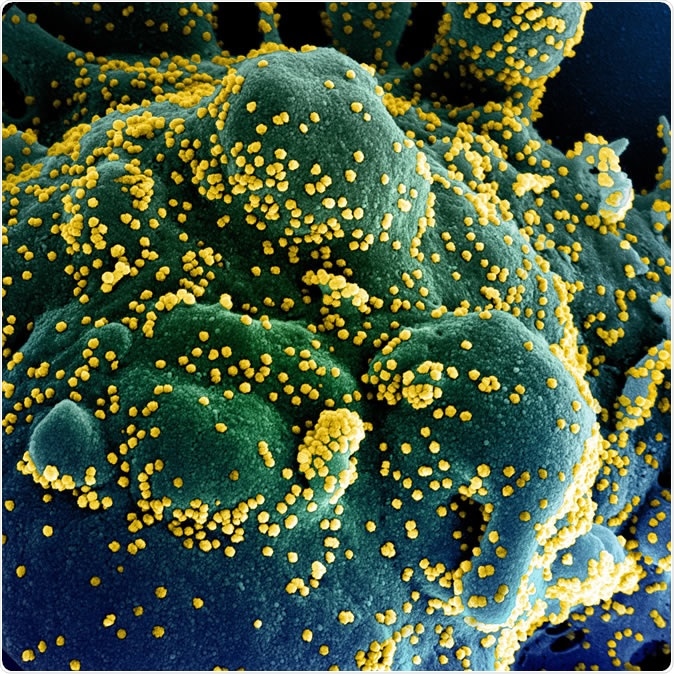The current coronavirus disease (COVID-19) pandemic, caused by the severe acute respiratory syndrome coronavirus 2 (SARS-CoV-2), has affected nearly all countries with nearly 2.4 million infected individuals and over 164 thousand deaths worldwide.

Novel Coronavirus SARS-CoV-2 Colorized scanning electron micrograph of an apoptotic cell (blue/green) heavily infected with SARS-COV-2 virus particles (yellow), isolated from a patient sample. Image captured at the NIAID Integrated Research Facility (IRF) in Fort Detrick, Maryland. Credit: NIAID
Although several medications have been experimentally used in the treatment of patients with life-threatening clinical presentation, none of them showed complete effectiveness. Also, there are currently no approved vaccines to prevent the infection with SARS-CoV-2.
The hunt for a perfect vaccine candidate
Alongside social distancing and other epidemiological measures (which are already pervasive), vaccine development and its application are expected to play a pivotal role in spread containment or viral elimination. However, the lack of adequate knowledge regarding the immune system response against viral infection is one of the significant hurdles in the path of SARS-CoV-2 vaccine development.
At the moment, several vaccine design efforts are underway to address this challenge, with considerable advancements in our understanding of virus biology. A vaccine utilizing a genetic platform known as mRNA (messenger RNA) even entered a phase I clinical trial, where primarily safety data will be collected on a small number of volunteers.
In the meantime, the quest for a perfect vaccine candidate in this global race continues. Recently, scientists from the Centre Zoological Survey of India, based in New Alipore in Kolkata, undertook a pilot attempt to describe potential immunogenic targets of SARS-CoV-2 and, consequently, proposed a new multi-epitope vaccine construct.
Epitopes and the immune response
"We believe that an ideal multi-epitope vaccine candidate can enhance immune response and subsequently lower down the risk of re-infection by upraising the host immunogenicity", explain study authors led by Dr. Abhishek Singh and Dr. Mukesh Thakur from the Centre for Forensic Sciences, Zoological Survey of India (New Alipore) in Kolkata, India.
An epitope is basically an antigenic determinant, which is a part of the virus that elicits an immune system response regulated by antibodies, B cells, or T cells. Some early studies in the quest for SARS-CoV-2 vaccines identified potential epitopes found within the spike glycoprotein.
In this new study, the researchers applied integrated approaches for vaccine design (involving computational and immunoinformatic science) by mapping humoral and adaptive human immune response (B-cells, T-cells and interferon-gamma epitopes) on the structural proteins of a novel coronavirus.
To appraise the immunogenic potential of the vaccine candidate, repeated exposure consisting of 12 injections has been simulated within many different bioinformatic platforms. Certain issues that may hamper vaccine effectiveness – most notably weak antigenicity, low effectiveness, low affinity for the immune cells, allergenicity or the propensity for autoimmune reactions – have been thoroughly evaluated.
Neutralizing SARS-CoV-2
By undertaking this specific in silico approach, the retrieved structural proteins and their antigenicity score pointed towards the envelope protein as the most likely candidate to generate a potent immune response, considering its prominent role in viral assembly.
But the use of other epitopes is also needed if we want to elicit full protection. "We identified epitopes corresponding to B cells and T cells in each structural protein so that both humoral and cellular immunity can be induced with the exposure of vaccine construct," state study authors.
Consequently, epitopes selected by employing the most robust criteria were included in the final vaccine construct. Some of these criteria were the antigenic nature of the epitope, complete conservation among the target proteins, the affinity for multiple alleles, lack of homology with any of the human proteins, coverage for more than 50 percent of the global population, as well as the lack of allergic responses.
A surge in the immune memory linked to B cells and T cells has been observed during the exposure, while the levels of interferon-gamma were consistently high from the first to last exposure. This means that a robust immune response is generated after short exposure, while immunity increases even after successive exposures.
"Based on the computational and immunoinformatics approaches, we propose that the designed vaccine has all the potential to induce both the innate and adaptive immune systems and can neutralize the SARS-CoV-2", study authors conclude. Further validation of this vaccine candidate must be pursued to reach a consensus on its safety and efficacy.
Source:
Journal reference:
- Singh, A. (2020). Designing a multi-epitope peptide-based vaccine against SARS-CoV-2. bioRxiv preprint server. https://doi.org/10.1101/2020.04.15.040618